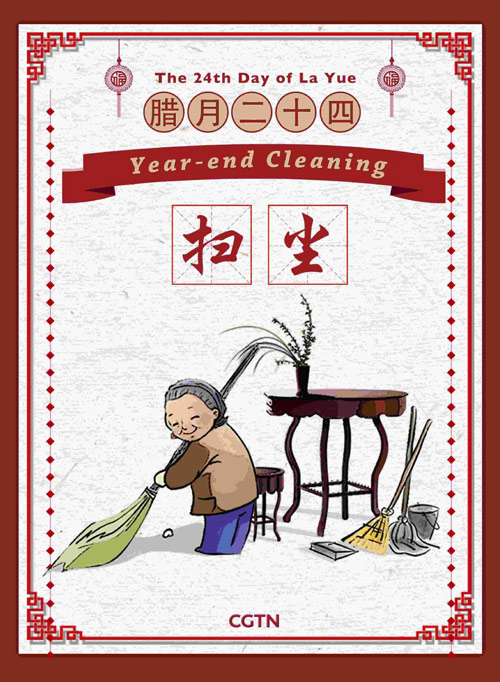春节进入了30天倒计时,从现在开始,年味将越来越浓。在中国古代,从小年开始,人们就开始忙活着准备过年了。一起来了解一下过年都有哪些传统。

[Photo/CGTN]
The 23rd day of La Yue in north China and the 24th day of the month in south China are the Xiao Nian Festival on the Chinese lunar calendar. Xiao Nian is also called "Little (Chinese) New Year," symbolizing the start of the Spring Festival.
北方腊月二十三、南方腊月二十四是小年,人们在小年这天开始进入过年的节奏。
On this day, people usually do house-cleaning. It's said that most of the gods go back to heaven to state their work in the concluded year, so people can do the cleaning without disturbing or offending them.
小年这天,人们通常会打扫房屋。据说多数神仙都会在这天回天庭汇报工作,因此人们在这天大扫除不会触犯神灵。

[Photo/CGTN]
In our legends, the Jade Emperor, the ruler of the heaven, descend to earth to inspect the world on this day, to see if every household lives an honest, frugal, and diligent life. To show the frugality and pray for the emperor's reward, traditionally people make bean curd, or Tofu, cheap food in China.
传说玉皇大帝会在腊月二十五下凡巡视人间,看家家户户是否都过着诚实勤俭的生活。为了表现得节俭以获得玉皇大帝降福,传统上人们会磨豆腐来吃,豆腐在中国是一种便宜的食品。
In northeast China, people make a decent amount of Nian Dou Bao, a kind of bun made of glutinous millet stuffed with red bean paste. Nian Dou Bao is also a staple food during the Spring Festival.
在北方,人们还会在这天做很多粘豆包,这是一种用糯米做的豆沙馅儿包子。粘豆包也是春节的主食之一。

[Photo/CGTN]
Many families typically eat pork and cook the meat. Other families, who don't raise pigs, go to the local fair for a hunk of meat. In the agrarian society in the past, people hardly have a chance to enjoy meat except for the Spring Festival. The meat also represents the biggest celebration throughout the year.
腊月二十六这天,许多家庭通常都会炖猪肉和吃猪肉。不养猪的家庭会去当地集市买一大块肉。在过去的农业社会,人们只有在春节才能吃上肉。吃肉也代表着一年中最盛大的庆祝活动。

[Photo/CGTN]
Do the laundry, bathe or take a good shower. Those activities symbolize for washing off all the bad luck and potential illness in the upcoming Chinese New Year.
腊月二十七,人们会洗衣、沐浴或洗澡。这代表着洗掉过去一年所有的晦气,让来年百病不生。
In places like Beijing and Tianjin, an old tradition is to eat a rooster. Most people prefer a rooster instead of hen because of its majestic looking, and believe it will bring good luck.
在北京和天津等地还有吃公鸡的旧俗。多数人吃公鸡而不吃母鸡是因为公鸡外形雄伟,认为吃公鸡能带来好运。

[Photo/CGTN]
It's a tradition to prepare in advance all staple food for the whole family to eat during the first week of Zheng Yue (the first month of the Lunar New Year). Usually, the staple food is flour-made because it's easy to store. The activity starts from 28th and may last for one or two days.
按照传统人们会提前准备好正月第一周全家人要吃的所有主食。通常这些主食都是用面粉做的,因为易于储存。人们从腊月二十八开始制作主食,可能会持续一两天。
People from the north make steamed buns with leavened doughs, while people in the south prefer Year Cake, or Nian Gao, made by glutinous rice. The steamed buns can be in various shapes, including cute animals, flowers, etc.
北方人会用发酵面团蒸馒头,而南方人会用糯米做年糕。馒头可以做成多种形状,包括可爱的动物、花朵等。

[Photo/CGTN]
People in most of the areas get up early to sweep tombs for their ancestors and burn incense and joss papers in memorial of them. This is also a reflection of the traditional value "Xiao," or filial piety, in China.
腊月二十九这天,很多地区的人们都会早起为祖先扫墓,焚香烧纸祭奠。这反映了中国传统价值观中的“孝道”。

[Photo/CGTN]
Finally, it's the Spring Festival Eve. This day is regarded as the most important day for family reunion throughout the year. Children who work or study outside the hometown, return home to celebrate the festival with their family.
终于到除夕了。这一天是一年中家庭团聚最重要的日子。在外工作或学习的孩子们都会回家和家人一起过除夕。
The whole family enjoys a big feast at night while watching the Spring Festival gala. They stay up late and wait to ring in the New Year. A must-eat food is dumplings. Elders give kids red packets, or red envelopes, with cash in them.
全家人一边观看春节晚会一边享用盛大晚餐。人们会熬夜等待新年钟声敲响。饺子是必吃的食物。老人会给小孩发红包。
In the days between 28th and 30th of La Yue, people also put on couplets on the gates, paper-cutting decorations on the windows, and New Year pictures on the walls of their homes to express their best wishes.
从腊月二十八到腊月三十,人们还会在大门上贴对联、在窗户上贴剪纸、在室内墙上贴年画,来表达美好祝愿。

[Photo/CGTN]
Embracing the first day of the New Year, people visit friends and relatives' homes and make New Year's greetings to each other. They use auspicious words to pray for good luck in the New Year.
农历新年的第一天,人们会走亲访友,互致新年问候。人们会说吉利话,祝愿新年交好运。
Gong Xi Fa Cai (congrats for being more prosperous and better off), Wan Shi Ru Yi (everything goes as you wish), Shen Ti Jian Kang (being fit and healthy) are among the most frequently used greeting terms.
最常用的祝福语有恭喜发财、万事如意、身体健康。

[Photo/CGTN]
As married daughters traditionally spend the Spring Festival Eve with their husbands' families, on this day it's time to return to their original home and visit their families.
传统上出嫁的女儿在婆家过除夕,所以在正月初二这天女儿会回娘家看望亲人。
Today, this custom is weakened, since more people spend the eve of Chinese New Year in many different ways – not necessarily in their husbands' homes.
现在这一习俗被弱化了,因为人们过除夕的方式变得更多样,不一定在婆家过。

[Photo/CGTN]
This day is called "Zheng Yue Shi Wu," or the Lantern Festival. Except for another warm family reunion, every household also hangs lanterns in front of the gate or on the balcony. It's also common to use colored lights to decorate the windows.
正月十五是元宵节。除了再次和家人温暖团聚之外,家家户户还会在门前或阳台上挂起灯笼。还有很多人用彩灯来装饰窗户。
In some specially-held local lantern fair, there are riddles written on paper hanging under the lanterns. People can entertain themselves by guessing the answer of the riddles. A typical food on that day for northerners is Yuan Xiao, a ball-shaped dessert made with glutinous rice. Southerners eat Tang Yuan, a similar meal made by different techniques.
在一些地方特别举办的元宵灯会上,人们还会把谜语写在纸上挂在灯笼下面。人们猜灯谜以自娱。北方人过元宵节会吃元宵,一种用糯米制作的球状甜点。南方人吃汤圆,类似于元宵,只是制作方法不同。
英文来源:CGTN
翻译&编辑:丹妮